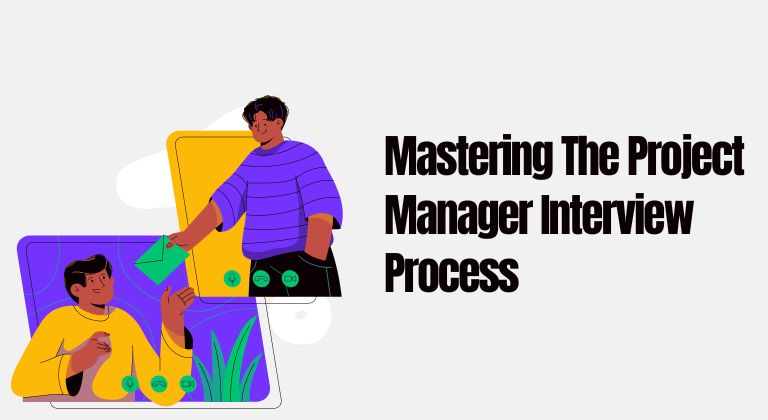To get a project manager job, gain relevant experience and skills, tailor your resume to highlight your project management abilities, and network with professionals in the industry. In today’s competitive job market, it is essential to stand out as a project manager candidate by showcasing your expertise and qualifications.
Project management is a dynamic and in-demand field, with numerous career opportunities available. As companies increasingly recognize the importance of effective project management for their success, the demand for skilled project managers continues to grow. Whether you are an experienced professional looking to advance your career or someone just starting in project management, there are steps you can take to increase your chances of securing a project manager job.
This article will guide you through the process, providing valuable tips and insights on how to successfully navigate the job search and land a project manager position.
Let's See the Topic Overview
Discover The Key Skills Employers Look For In Project Managers
Project management is a highly sought-after career path that offers a wide range of opportunities in various industries. Whether you are a seasoned professional or just starting out, it is important to understand the key skills that employers look for in project managers.
These skills not only demonstrate your ability to drive successful projects, but also set you apart from other candidates in a competitive job market. Let’s explore some of the essential skills that employers value in project managers.
Understanding Project Management Essentials
- Proficient knowledge of project management methodologies and frameworks, such as agile, waterfall, and scrum.
- Strong understanding of project lifecycle, from initiation to closure, including planning, execution, monitoring, and controlling.
- Ability to develop and manage project schedules, including milestones, dependencies, and resource allocation.
- Aptitude for risk management, including identifying potential risks, creating contingency plans, and mitigating issues that may arise during project implementation.
Adaptability And Problem-Solving Skills
- Demonstrated ability to adapt to changing project requirements and navigate unexpected challenges.
- Strong problem-solving skills to identify and address project roadblocks effectively.
- Proactive approach to anticipate potential issues and provide innovative solutions.
- Ability to prioritize tasks and resources based on project objectives and constraints.
Effective Communication And Interpersonal Skills
- Excellent verbal and written communication skills to convey project status, updates, and expectations clearly and concisely.
- Active listening skills to understand and address stakeholders’ concerns and expectations.
- Strong negotiation and conflict resolution skills to facilitate productive discussions and reach consensus.
- Ability to build positive relationships with team members, stakeholders, and clients to foster collaboration and achieve project goals.
In Summary
The role of a project manager requires a diverse set of skills that go beyond technical expertise. By showcasing your understanding of project management essentials, adaptability, problem-solving skills, and effective communication and interpersonal skills, you can demonstrate your ability to successfully lead projects and contribute to organizational success.
As you prepare for your project manager job search, make sure to highlight these key skills in your resume, cover letter, and job interviews.
Remember, possessing the right skills is one aspect of securing a project manager job. Arm yourself with relevant certifications, gain practical experience through internships or side projects, and continuously improve your skills through professional development opportunities. With the right combination of skills, knowledge, and determination, you can increase your chances of landing your dream project manager job and kick-starting a rewarding career in project management.
Crafting A Winning Project Manager Resume

Crafting a well-designed and impactful resume is crucial for landing a project manager job. Your resume should not only highlight your relevant experience and skills but also demonstrate your ability to deliver successful projects. Tailoring your resume to the specific job requirements, highlighting relevant project management experience, and showcasing measurable achievements and results are essential elements for creating a winning project manager resume.
Tailoring Your Resume To The Specific Job Requirements
When applying for a project manager position, it is important to customize your resume to match the specific job requirements. Here are some key points to consider:
- Carefully review the job description and identify the key skills and qualifications the employer is seeking.
- Analyze your own experience and skills to determine which ones are most relevant to the job.
- Create a resume summary or objective that clearly articulates your suitability for the role and aligns with the employer’s expectations.
- Modify your work experience section to highlight projects and responsibilities that closely align with the job requirements.
- Incorporate relevant keywords from the job description throughout your resume to increase its visibility to ats (applicant tracking systems).
Highlighting Relevant Project Management Experience
Your project management experience is a critical factor in determining your suitability for a project manager role. To effectively highlight your experience, consider the following:
- Start by listing your previous project management roles in reverse chronological order, focusing on positions that are relevant to the job you’re applying for.
- Provide concise yet specific descriptions of the projects you have managed, including details such as project scope, deliverables, and team size.
- Emphasize any instances where you successfully completed projects on time and within budget.
- Showcase your ability to lead and collaborate with cross-functional teams, ensuring successful project outcomes.
- Mention any relevant certifications or training you have obtained, such as pmp (project management professional) certification.
Showcasing Measurable Achievements And Results
Employers are interested in candidates who have a track record of achieving measurable results. When crafting your project manager resume, make sure to:
- Quantify your achievements whenever possible, such as completing projects ahead of schedule or reducing costs by a certain percentage.
- Highlight any improvements or efficiencies you implemented in previous roles that resulted in increased productivity or cost savings.
- Include specific examples of successful project outcomes, such as delivering a product launch that resulted in a certain number of new customers or generating revenue growth.
- Use action verbs to describe your accomplishments, such as “managed,” “implemented,” or “oversaw,” to convey a sense of ownership and proactive leadership.
Remember, a winning project manager resume should clearly demonstrate your ability to manage projects, lead teams, and achieve successful outcomes. By tailoring your resume to the specific job requirements, highlighting relevant project management experience, and showcasing measurable achievements and results, you’ll increase your chances of securing your dream project manager job.
Mastering The Project Manager Interview Process

Thoroughly Researching The Company And The Role
Before going into any interview, it’s essential to thoroughly research the company and the role you are applying for. This not only shows your interest and dedication, but it also helps you tailor your answers and showcase your knowledge during the interview.
Here are some key points to keep in mind when conducting your research:
- Understand the company’s history, values, mission, and culture.
- Familiarize yourself with the industry the company operates in.
- Study the job description and requirements to identify the skills and qualifications they are seeking.
- Research recent projects or initiatives the company has undertaken.
- Look for any news articles or press releases related to the company.
Preparing Compelling Answers To Common Project Manager Interview Questions
Being well-prepared for common project manager interview questions is crucial to impress your potential employer. Take the time to develop thoughtful and compelling answers that highlight your skills, experience, and suitability for the job. Here are some common project manager interview questions to keep in mind:
- Describe a project that you successfully completed, highlighting your role and the outcome.
- How do you handle conflicting priorities and manage time effectively?
- How do you motivate your team to meet project goals?
- What project management methodologies and tools are you familiar with?
- How do you handle risks and mitigate potential issues during a project?
- Can you give an example of a challenging project and how you dealt with it?
- How do you ensure effective communication and collaboration within a project team?
Demonstrating Your Leadership And Decision-Making Abilities
In any project management role, leadership and decision-making abilities are highly valued. During the interview, you need to showcase your capacity to lead a team and make informed decisions. Here are some key points to focus on:
- Highlight your experience in leading and managing teams.
- Provide examples of how you have handled challenges and made difficult decisions in the past.
- Discuss your approach to problem-solving and critical thinking.
- Emphasize your ability to delegate tasks and empower team members.
- Explain how you foster collaboration, communication, and teamwork.
- Share any instances where you took a proactive and innovative approach to achieve project success.
Remember, mastering the project manager interview process requires thorough preparation, compelling answers, and a demonstration of your leadership and decision-making abilities. By taking the time to research the company and role, preparing thoughtful responses, and showcasing your skills, you will increase your chances of landing the project manager job you desire.
Good luck!
Building A Network And Leveraging Personal Connections

Networking is a crucial aspect of any job search, and it holds true for aspiring project managers as well. Building a strong professional network and leveraging personal connections can significantly enhance your chances of landing a project management job. Here are some effective strategies to help you in this endeavor:
Joining Professional Project Management Associations
- Identify and join relevant professional project management associations such as the project management institute (pmi) or the international project management association (IPMA).
- Attend their networking events, conferences, and seminars to connect with experienced project managers and industry professionals.
- Participate actively in association activities and discussions to establish your presence and credibility within the industry.
- Take advantage of their online platforms and forums to engage in meaningful conversations and build connections with like-minded professionals.
Utilizing Linkedin For Networking And Job Opportunities
- Create a compelling LinkedIn profile that highlights your project management skills and expertise.
- Connect with colleagues, friends, professors, and professionals you have worked with in the past to expand your network.
- Join relevant project management groups and participate in discussions to showcase your knowledge and connect with practitioners in the field.
- Actively engage with other professionals’ content by commenting, sharing, and providing valuable insights to establish your credibility.
- Leverage Linkedin’s job search feature to find project management job opportunities and apply directly through the platform.
Harnessing The Power Of Informational Interviews
- Reach out to project managers or professionals working in project management roles and request informational interviews.
- Prepare a list of questions to gain insights into their career path, challenges, and advice for aspiring project managers.
- Use these interviews as an opportunity to build connections and showcase your genuine interest in the field.
- Follow up with a thank-you note expressing your appreciation for their time and insights.
- Keep these connections alive by periodically updating them on your career progress and remaining engaged with their professional journey.
Remember, building a network is not just about approaching people when you need a job. It’s about establishing meaningful relationships, contributing to the project management community, and being a valuable resource for others. Investing time and effort in networking and leveraging personal connections will set you apart from other job candidates and enhance your chances of securing your dream project manager role.
Leveraging Online Resources To Enhance Your Credentials
In today’s digital age, leveraging online resources has become essential for enhancing your credentials as a project manager. The internet offers a vast array of tools and platforms that can help you develop your skills, connect with other professionals, and showcase your expertise.
Here are some effective strategies to consider:
Pursuing Project Management Certifications And Training Courses
Obtaining relevant certifications and completing training courses can greatly boost your credentials as a project manager. Here are key points to keep in mind:
- Research and identify reputable certification programs, such as the project management professional (pmp) certification offered by the project management institute (pmi).
- Determine the specific certifications that align with your career goals and industry demands.
- Enroll in online training courses that offer flexible schedules and comprehensive study materials.
- Allocate dedicated time and effort to prepare for certification exams, including utilizing online practice tests and exam simulations.
- Highlight your certifications on your resume, linkedin profile, and other professional platforms.
Participating In Online Forums And Communities For Project Managers
Engaging with online forums and communities dedicated to project management not only provides valuable networking opportunities but also allows you to learn from industry peers and share your own insights. Consider these key points:
- Join popular project management forums like projectmanagement.com or pmi community, where professionals from around the world discuss various project management topics.
- Actively participate in discussions, share your knowledge, and ask questions to foster meaningful interactions.
- Follow influential project management thought leaders and engage with their content to expand your network.
- Use online forums as a platform to seek advice, share challenges, and gain different perspectives on common project management issues.
Showcasing Your Expertise Through Blogging Or Guest Writing
Creating and sharing project management-related content through blogging or guest writing not only establishes you as an industry expert but also enhances your online presence. Here’s what you need to know:
- Start a project management blog where you can share your experiences, insights, and best practices.
- Research and contribute guest articles for renowned project management websites and publications to expand your reach.
- Focus on producing high-quality, informative content that resonates with your target audience.
- Utilize seo strategies to optimize your blog posts for search engines, ensuring your content reaches a wider audience.
- Promote your blog posts and guest articles through social media channels, professional networks, and email newsletters to increase visibility.
By leveraging online resources, such as certifications, online forums, and content creation, you can effectively enhance your credentials as a project manager. Embrace these strategies to establish yourself as a reputable professional in the field, attract new opportunities, and stay ahead in your project management career journey.
Showcasing Your Project Management Skills Through Real-World Examples
When it comes to landing a project manager job, showcasing your project management skills is crucial in impressing potential employers. One effective way to demonstrate your capabilities is by sharing real-world examples of projects you have successfully managed. By highlighting your achievements and practical experience, you can convey your ability to handle various project challenges and show your contributions to cost savings and process improvements.
Providing Case Studies Of Successful Projects You’Ve Managed:
- Highlight projects that align with the industry or company you are applying to, emphasizing the relevant skills and accomplishments.
- Provide a brief overview of the project, including its objectives, scope, and timeline.
- Clearly outline your role and responsibilities in managing the project.
- Describe the challenges faced during the project and how you effectively addressed them.
- Showcase the strategies and tools you implemented to ensure project success.
- Quantify the results achieved, such as meeting deadlines, achieving performance targets, or exceeding client expectations.
Demonstrating Your Ability To Handle Various Project Challenges:
- Discuss specific project challenges you have encountered and successfully resolved.
- Explain how you approached each challenge and the steps you took to overcome them.
- Highlight your problem-solving skills and decision-making abilities in handling unexpected issues.
- Provide examples of ways you effectively managed project risks and mitigated potential obstacles.
- Demonstrate your flexibility and adaptability in adjusting project plans to ensure successful outcomes.
- Emphasize any recognition or positive feedback received from stakeholders or clients for your handling of project challenges.
Presenting Your Contributions To Cost Savings And Process Improvements:
- Describe situations where you identified cost-saving opportunities within projects you managed.
- Explain the strategies or process enhancements you implemented that resulted in significant cost reductions.
- Provide concrete examples of how you streamlined processes to improve efficiency and productivity.
- Quantify the cost savings or process improvements achieved and their impact on the overall project.
- Highlight any awards, recognition, or testimonials received for your contributions to cost savings and process improvements.
- Illustrate your ability to think strategically and make data-driven decisions to optimize project outcomes.
Remember, when sharing your real-world examples, focus on the most relevant and impactful projects that showcase your project management skills. Be concise, provide specific details, and use metrics whenever possible to clearly convey your achievements. By effectively showcasing your project management skills through real-world examples, you increase your chances of securing a desirable project manager job.
Nailing The Project Manager Role In A Remote Work Environment
In today’s digital age, remote work has become increasingly prevalent, and project managers need to adapt and excel in this virtual setting. Successfully demonstrating your ability to thrive in a remote work environment is essential when applying for project manager roles.

Here are some key points to consider:
Highlighting Your Remote Work Experience And Success
- Emphasize any experience you have working remotely, whether it’s from previous project manager roles or other positions. Showcase your adaptability and ability to excel in a virtual setting.
- Highlight specific remote projects you have managed successfully, focusing on outcomes and achievements. Discuss how you effectively coordinated virtual teams to deliver projects on time and within budget.
- Mention any challenges you encountered while working remotely and how you overcame them, demonstrating your problem-solving skills and resilience.
Discussing Your Ability To Manage Virtual Teams And Stakeholders
- Explain your experience in managing virtual teams, highlighting how you effectively communicated, organized, and motivated team members dispersed across different locations.
- Discuss how you fostered collaboration and ensured seamless communication among team members through various channels such as video conferencing, instant messaging, and project management software.
- Share examples of how you successfully engaged remote stakeholders, emphasizing your ability to build relationships and effectively communicate project updates, milestones, and issues.
Showcasing Your Proficiency In Remote Project Management Tools And Communication Platforms
- List the project management tools and communication platforms you are familiar with, such as asana, trello, slack, and zoom. Highlight your proficiency in using these tools to facilitate remote collaboration and streamline project workflows.
- Describe how you utilized these platforms to track project progress, assign tasks, and manage deadlines effectively. Demonstrate your ability to create workflows that ensure transparency and accountability among remote team members.
- Share any relevant training or certifications you have obtained in utilizing remote project management tools, showcasing your commitment to staying updated with industry best practices.
Remember, incorporating these points into your project manager job application will help you stand out in a remote work environment. By highlighting your remote work experience, virtual team management skills, and proficiency in remote project management tools, you will demonstrate to potential employers that you are well-equipped to excel as a project manager in today’s digital landscape.
Negotiating Compensation And Securing The Best Project Manager Offer
Researching Industry-Standard Salaries And Benefits
When it comes to negotiating compensation for a project manager job, it’s essential to do your homework and ensure you have a clear understanding of industry-standard salaries and benefits. By researching this information beforehand, you will be better equipped to negotiate a fair and competitive offer.
Here are key points to consider:
- Look up salary data: Utilize online resources, such as salary comparison websites and industry reports, to research average salaries for project managers in your location and industry.
- Consider your experience and qualifications: Take into account your level of experience, education, certifications, and any specialized skills or knowledge that may warrant higher compensation.
- Factor in benefits and perks: In addition to the base salary, consider the value of benefits such as health insurance, retirement plans, vacation time, and any other perks offered by the company.
- Analyze market trends: Stay updated on industry trends and economic conditions that may influence salary ranges and benefits packages.
- Network and gather insights: Connect with professionals working in the project management field to gain insights into typical compensation and benefits offered by employers.
Preparing For Salary Negotiations And Discussing Additional Perks
Negotiating your project manager offer involves more than just talking about the base salary. It’s an opportunity to discuss additional perks and benefits that can enhance your overall compensation package. Here’s what you need to know:
- Research the company’s compensation practices: Understand the company’s approach to salary negotiations and the extent to which they offer additional perks or benefits.
- Highlight your value: During negotiations, emphasize your qualifications, achievements, and the unique value you bring to the role. Demonstrate how your skills will contribute to the company’s success.
- Be confident but flexible: Negotiations may involve give and take. Be assertive in expressing your desired compensation while remaining open to alternative solutions or compromise.
- Consider non-monetary perks: Beyond salary, explore opportunities for professional development, flexible work arrangements, remote work options, or other benefits that align with your priorities.
- Prioritize your needs: Assess what matters most to you in terms of compensation. Do you value a higher salary, a better work-life balance, or opportunities for growth and advancement?
- Keep the big picture in mind: Before entering negotiations, define your ideal compensation package and set realistic expectations. Consider the long-term benefits of the role beyond immediate financial gain.
Evaluating The Full Compensation Package, Including Professional Development Opportunities
Securing the best project manager offer goes beyond salary and benefits alone. It’s crucial to assess the full compensation package, taking into account professional development opportunities and growth potential. Here are some points to consider:
- Assess training and skill development: Look for company-sponsored training programs, conferences, workshops, or mentorship opportunities that can help enhance your project management skills.
- Evaluate advancement prospects: Consider the company’s track record of promoting employees and providing avenues for career growth. Will the role offer opportunities for upward mobility?
- Examine the company culture: Assess the work environment and company culture to ensure it aligns with your values and supports your professional growth and satisfaction.
- Gauge work-life balance: Consider factors such as flexible work hours, remote work options, and the company’s approach to work-life balance. Determine how these factors contribute to your overall well-being.
- Seek feedback from current employees: Connect with current or past employees to gain insights into the company’s commitment to professional development and overall employee satisfaction.
- Consider the value of additional benefits: Beyond salary and traditional benefits, evaluate any unique or special perks offered by the company, such as stock options, profit sharing, or wellness programs.
Remember, when negotiating compensation and evaluating the full package, it’s important to prioritize your needs and objectives. Consider the long-term benefits and opportunities that align with your career goals, resulting in a project manager job that not only offers competitive compensation, but also sets the stage for a fulfilling and successful career.
Final Thoughts: The Ultimate Guide To Landing Your Dream Project Manager Job
Recap Of The Key Insights Discussed In The Article
We have explored various aspects of getting a project manager job. Let’s recap the key insights discussed:
- Understanding the project management role: Project managers are responsible for planning, executing, and controlling projects to ensure successful outcomes. They need to have strong organizational, communication, and leadership skills.
- Gaining relevant qualifications and certifications: To stand out as a project manager candidate, it is essential to obtain relevant qualifications, such as a bachelor’s or master’s degree in project management or a related field. Additionally, certifications like pmp (project management professional) can significantly boost your chances of landing a dream project management job.
- Developing relevant skills: Project management requires a diverse range of skills, including but not limited to leadership, problem-solving, decision-making, communication, risk management, and team coordination. It is vital to continuously develop and refine these skills through training, workshops, and hands-on experience.
- Building a strong professional network: Networking plays a crucial role in finding project manager job opportunities. Attend industry events, join professional associations, and engage in online platforms to meet fellow professionals, potential mentors, and employers. Building relationships within the industry can open doors to exciting project management positions.
Emphasizing The Importance Of Continuous Learning And Professional Growth
Project management is an ever-evolving field, and as a project manager, it is crucial to stay updated with the latest trends, methodologies, and best practices. Here’s why continuous learning and professional growth are vital aspects of landing your dream project manager job:
- Adapting to changing environments: The business landscape is constantly changing, and project managers need to be equipped with the skills and knowledge to navigate these shifts effectively. Continuously learning and staying up-to-date with industry trends enables project managers to adapt to changing environments and make informed decisions.
- Gaining a competitive edge: In a competitive job market, continuous learning sets you apart from other candidates. Employers value project managers who are committed to professional growth and show a willingness to expand their skill set.
- Improving job performance: Continuous learning allows project managers to enhance their existing skills and acquire new ones, ultimately leading to improved job performance. This not only benefits the individual but also positively impacts project outcomes and client satisfaction.
- Expanding professional network: Engaging in continuous learning opportunities, such as attending conferences or participating in webinars, provides opportunities to meet industry professionals. Expanding your professional network can lead to valuable connections, mentorship opportunities, and potential job referrals.
Encouraging Readers To Take Action And Begin Their Journey Towards A Dream Project Manager Job
Now that you have gained valuable insights into getting a project manager job, it’s time to take action and embark on your journey towards your dream role. Here are some steps you can take:
- Research job requirements: Familiarize yourself with the qualifications, skills, and experience typically sought after by employers in the project management field. This information will help you understand what you need to focus on to make yourself a competitive candidate.
- Craft a compelling resume: Tailor your resume to highlight your project management skills, relevant experience, and certifications. Use action verbs and quantitative achievements to demonstrate your effectiveness in managing projects.
- Develop a strong online presence: Create a professional linkedin profile and consider building a personal website to showcase your skills, projects, and achievements. Engaging with industry-related content and connecting with professionals in the field can also enhance your visibility.
- Network strategically: Connect with professionals in the project management field, both online and offline. Attend industry conferences, join project management associations, and engage in online communities. Building meaningful connections can open doors to job opportunities and provide guidance throughout your career.
- Continuously learn and grow: Commit to lifelong learning by pursuing certifications, attending workshops and training programs, and staying updated with industry trends. This will demonstrate your dedication to professional growth and make you a stronger candidate.
Remember, landing your dream project manager job takes time and effort. Stay persistence, keep learning, and be proactive in seeking opportunities. With the right combination of skills, qualifications, and a passion for project management, you can achieve your career goals.
Good luck on your journey!
Frequently Asked Questions On How To Get A Project Manager Job?
How Do I Become A Project Manager?
To become a project manager, you should gain project management skills, get certified, and gain relevant experience. Start by learning project management methodologies and tools, and then pursue certifications like pmp or prince2. Gain experience by working on projects and demonstrating your skills in planning, organizing, and leading teams.
What Qualifications Do I Need To Be A Project Manager?
To be a project manager, you typically need a bachelor’s degree in a relevant field, such as business, engineering, or it. However, some employers may accept equivalent work experience in lieu of a degree. Additionally, certifications like pmp (project management professional) or prince2 can boost your chances of landing a project manager role.
What Are The Key Responsibilities Of A Project Manager?
As a project manager, your key responsibilities include defining project goals, creating a project plan, assigning tasks, managing resources, monitoring progress, and ensuring successful project delivery. You’ll also need to communicate with stakeholders, resolve conflicts, and adapt to changes throughout the project lifecycle.
How Much Do Project Managers Earn?
Project managers’ salaries vary depending on factors like location, industry, experience, and qualifications. According to payscale, the average salary for a project manager is around $75,000 per year in the united states. However, this can range from $50,000 to over $100,000 depending on the factors mentioned above.
How Can I Gain Project Management Experience?
To gain project management experience, start by seeking opportunities within your current job or organization. Volunteer to lead projects or collaborate with project managers. You can also take on freelance or contract roles to gain hands-on experience. Another option is to contribute to open-source projects or manage personal projects to build your portfolio.
Attending workshops, seminars, and networking events can also enhance your experience and expand your professional network.
Conclusion
To secure a project manager job, it is important to showcase a combination of technical skills, leadership qualities, and effective communication. Employers value professionals who can effectively manage teams, streamline processes, and drive successful project outcomes. Utilizing a strong resume and personalized cover letter tailored to the specific job requirements can greatly increase your chances of landing an interview.
Additionally, leveraging professional networking platforms like linkedin and attending industry events can provide valuable connections and potential job opportunities. Continuously developing your skills through certifications and staying updated on industry trends will position you as a competitive candidate for project manager roles.
Remember to highlight your past achievements and relevant experiences during interviews to demonstrate your ability to effectively manage projects and deliver results. With the right approach and a determined mindset, you can make yourself a desirable candidate in the competitive field of project management.












